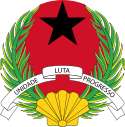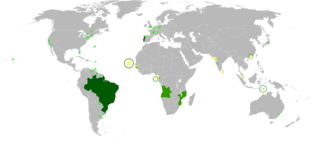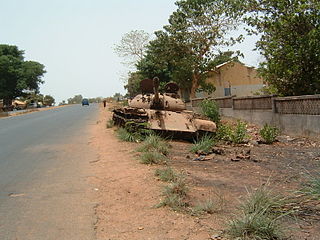
Politics of Guinea-Bissau takes place in a framework of a semi-presidential representative democratic republic in transition, whereby the President is head of state and the Prime Minister is head of government, and of a multi-party system. Executive power is exercised by the government. Legislative power is vested in both the government and the National People's Assembly.
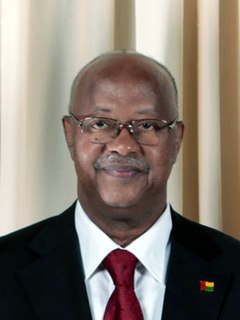
Carlos Domingos Gomes Júnior is a Guinea-Bissauan politician who was Prime Minister of Guinea-Bissau from 10 May 2004 to 2 November 2005, and again from 25 December 2008 to 10 February 2012. He has been the President of the African Party for the Independence of Guinea and Cape Verde (PAIGC) since 2002 and is widely known as "Cadogo". He resigned as prime minister on 10 February 2012 to run in the presidential election triggered by President Malam Bacai Sanhá's death on 9 January.
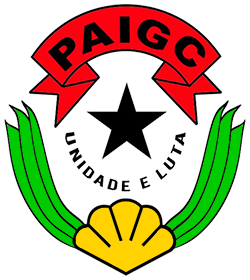
The African Party for the Independence of Guinea and Cape Verde is a political party in Guinea-Bissau. Originally formed to peacefully campaign for independence from Portugal, the party turned to armed conflict in the 1960s and was one of the belligerents in the Guinea-Bissau War of Independence. Towards the end of the war, the party established a Marxist–Leninist one-party state, which remained intact until multi-party democracy was introduced in the early 1990s. Although the party won the first multi-party elections in 1994, it was removed from power in the 1999–2000 elections. However, it returned to office after winning parliamentary elections in 2004 and presidential elections in 2005, since which it has remained the largest party in the National People's Assembly.

João Bernardo "Nino" Vieira was the President of Guinea-Bissau from 1980 to 1984, for the second time from 1984 to 1999, and for the third time from 2005 to 2009. After seizing power in 1980, Vieira ruled for 19 years, and he won a multiparty presidential election in 1994. He was ousted at the end of the 1998–1999 civil war and went into exile. He made a political comeback in 2005, winning that year's presidential election. Vieira was killed by soldiers on 2 March 2009, apparently in retaliation for a bomb blast that killed Guinea-Bissau's military chief General Batista Tagme Na Waie. The military officially denied these allegations after Army officials claimed responsibility for Vieira's death.

Elections in Guinea-Bissau take place within the framework of a multi-party democracy and a semi-presidential system. Both the President and the National People's Assembly are directly elected by voters.

The Struggle Front for the National Independence of Guinea was a political movement in Guinea-Bissau. Founded by groups opposed to the Marxist doctrine of Amílcar Cabral and the African Party for the Independence of Guinea and Cape Verde (PAIGC), FLING played a minor role in the national liberation struggle against Portuguese colonial rule.

Presidential elections were held in Guinea-Bissau on 19 June 2005, with a second round runoff on 24 July. The elections marked the end of a transition to democratic rule after the previously elected government was overthrown in a September 2003 military coup led by General Veríssimo Correia Seabra. The result was a victory for former President and independent candidate João Bernardo Vieira.

The United Platform was a political alliance in Guinea-Bissau.

The Electoral Union was a political alliance in Guinea-Bissau.

The Resistance of Guinea-Bissau-Bafatá Movement is a political party in Guinea-Bissau. Once the main opposition organisation in the country, it is today a minor party without parliamentary representation.
The Party for Social Renewal is a political party in Guinea-Bissau. It is one of the country's leading parties and is currently the main opposition party.
Manuel Saturnino da Costa is a Guinea-Bissau politician who served as Prime Minister of Guinea-Bissau from 26 October 1994 to 6 June 1997.

Presidential elections were held in Guinea-Bissau on 28 June 2009 following the assassination of President João Bernardo Vieira on 2 March 2009. As no candidate won a majority in the first round, a second round was held on 26 July 2009 between the two leading candidates, Malam Bacai Sanhá of the governing African Party for the Independence of Guinea and Cape Verde (PAIGC) and opposition leader Kumba Ialá. Sanhá won with a substantial majority in the second round, according to official results.

The Democratic Convergence Party is a political party in Guinea-Bissau.

The Alliance of Patriotic Forces was a political alliance in Guinea-Bissau. It consisted of the Union for Change (UM), Guinean Civic Forum-Social Democracy (FCG-SD), the Democratic Social Front (FDS) and the Solidarity and Labour Party (PST).

The Guinean League for Ecological Protection is a political party in Guinea-Bissau.

The Democratic Party of Progress is a political party in Guinea-Bissau.

The Social Democratic Party is a political party in Guinea-Bissau.
